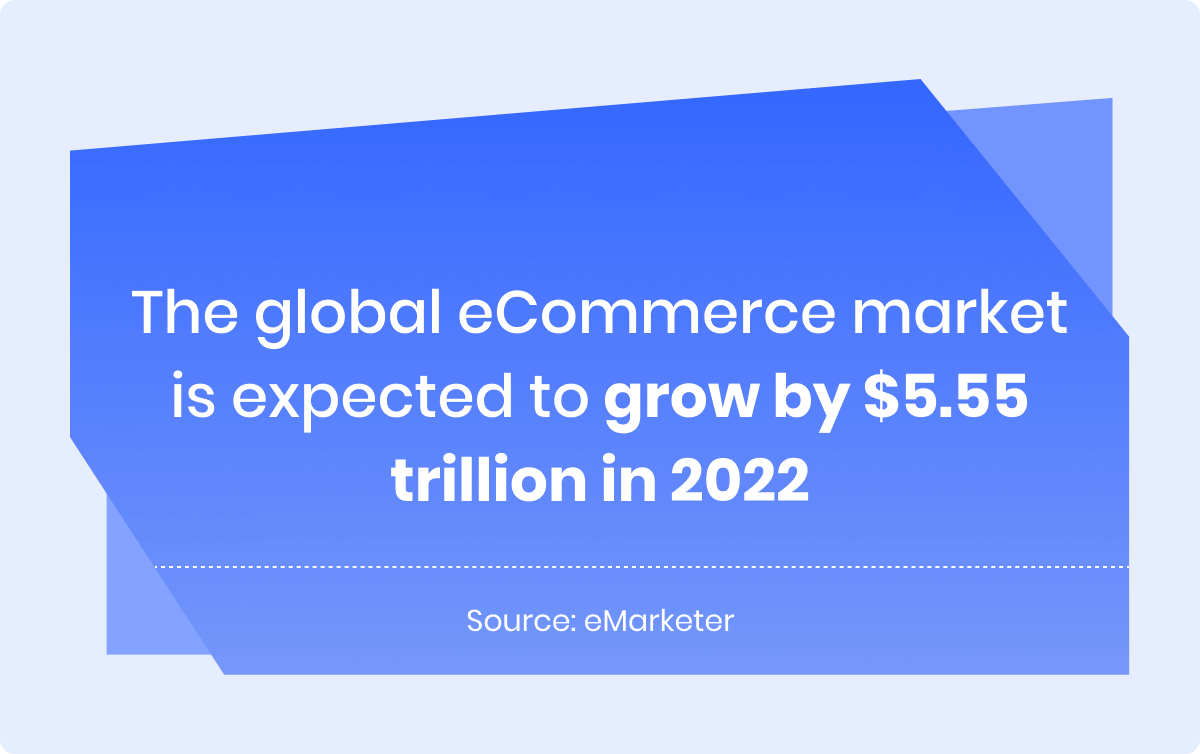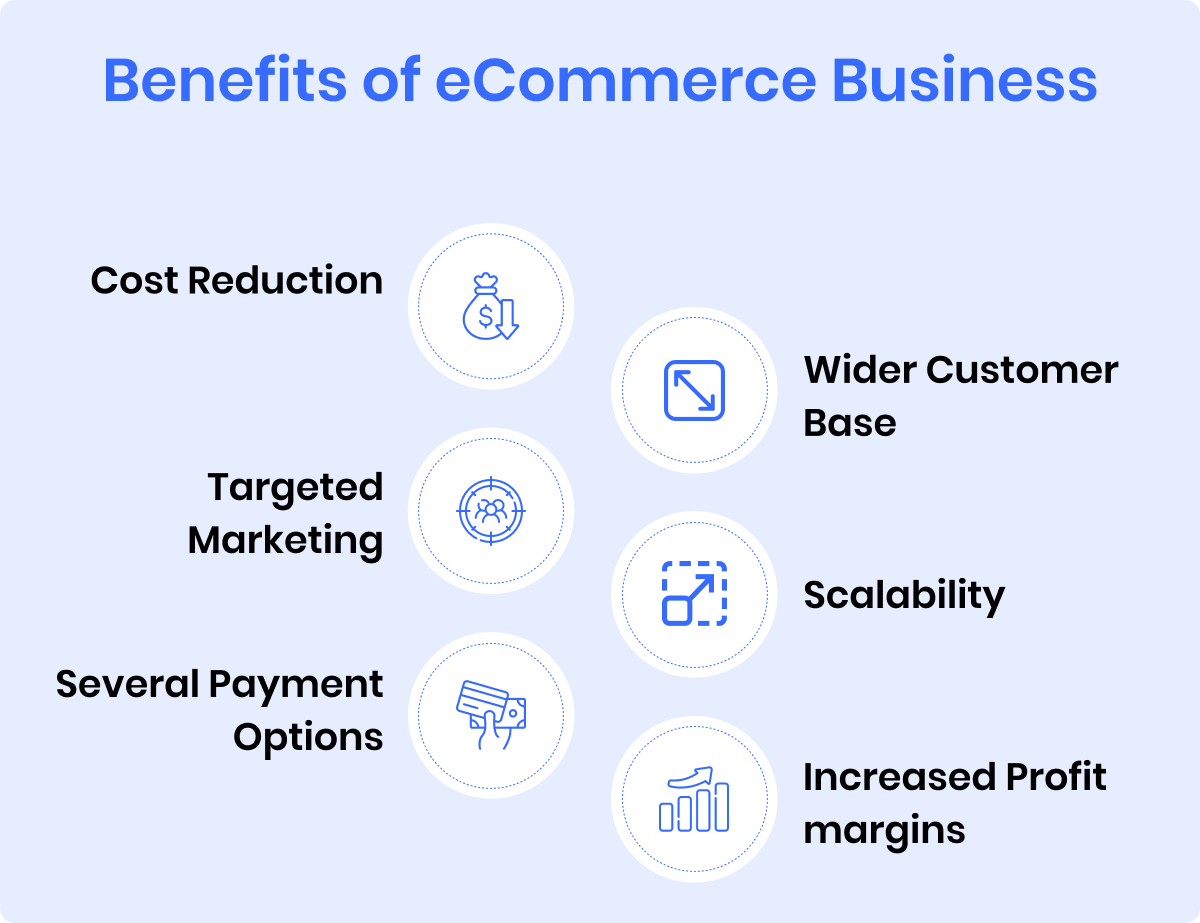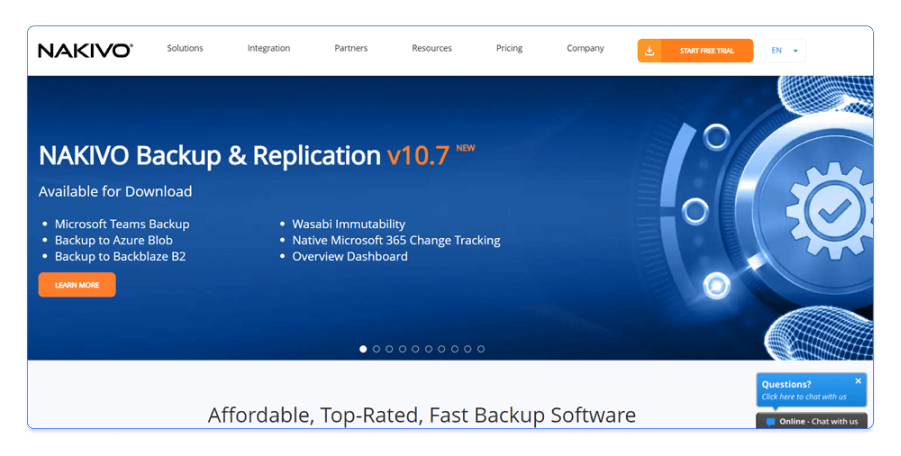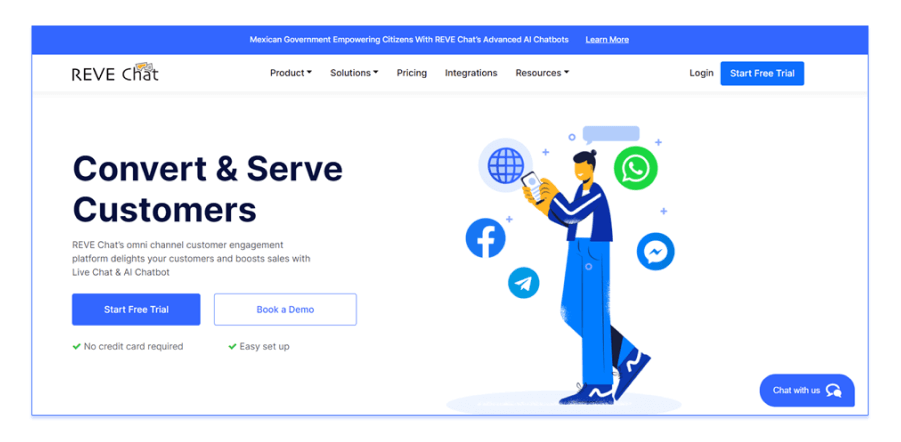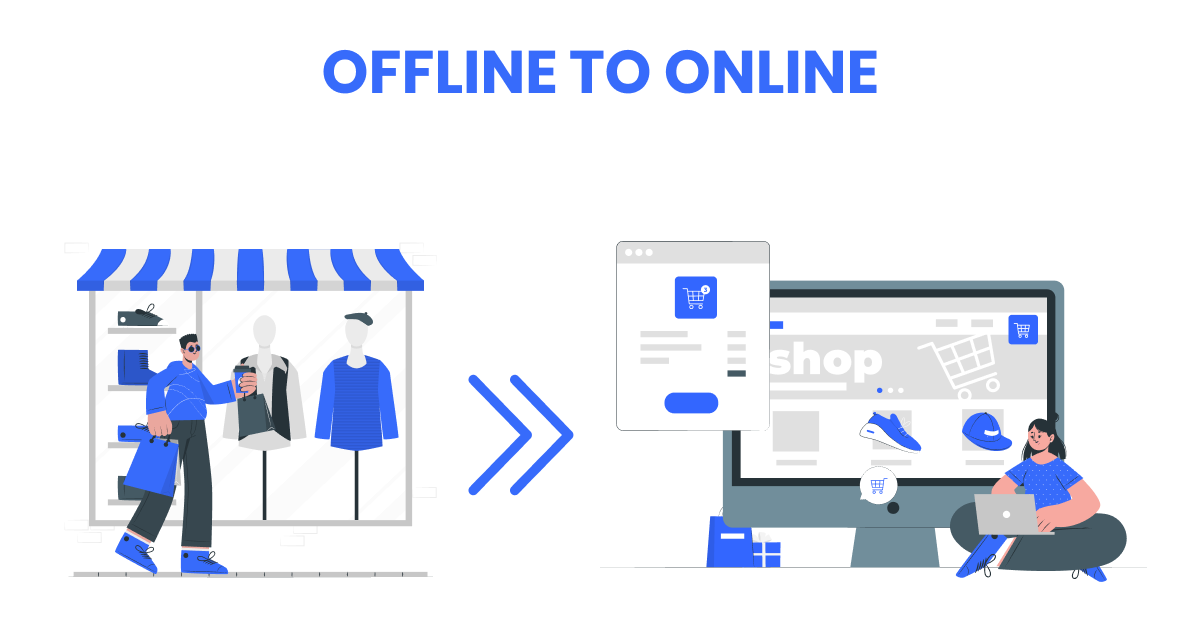17 Best eCommerce Tools for Scaling Your Business (2025)
- October 31, 2022
- 24 mins read
- Listen

Over the last two years, the global pandemic has changed many things in our lives. The whole business structure has drastically transformed. Most companies became online. Many businesses and retail shops were shut down, and physical shops started their online journey. in short, the whole world opted for online shopping for everything from basic needs to occasional shopping.
As per Statista, by 2023, global eCommerce sales are expected to boost by more than 3.5 trillion USD. This is a real good news for you. As online business is growing rapidly, investing and expanding the eCommerce company will be a great idea.
If you are just getting started, then this blog is just for you. Here we will discuss some of the best eCommerce tools that can help not only in building the website but also managing other segments like marketing, research, Analytics, customer service, content creation, and social media. Ecommerce tools have become an integral part for scaling eCommerce business nowadays.
These eCommerce tools not only help in sales and conversion but also will help you to keep pace with consumer demands and stand out against your competitors.
What is an eCommerce Tool?
It is developed to manage the functionality of your online store. From creating and hosting a website to marketing, analytics, customer service, and sales conversions, eCommerce software helps to streamline the whole process.
There are different types of tools or software available in the market, but they all serve a common purpose- to streamline, manage and automate the whole process of running an eCommerce business.
Why These eCommerce Tools are so Important?
Let me give you one example. In the agriculture industry, farmer uses his equipment to get best out of the soil. Without these tools, farming is next to impossible and even if its there, profits and progress will be badly hindered.
The eCommerce segment is just like the same. To hold on here, you also need some tools or software. With the various different eCommerce tools available in the market, you can streamline all the activities, manage the online business efficiently and even cut costs. These ecommerce tools and technologies can add value to your online business.
Most importantly while choosing the best tools for ecommerce, keep in mind that the software must include the below-mentioned features:
-
Website Development
Website development is the most important area to consider. Tools are available that will work as building blocks for your online store. Website building tools, including AI-powered builders, will help you to create and host a beautiful eCommerce website, enable customers to shop and provide them excellent customer experience.
Today’s online business already has some “titans” like Amazon and Walmart. They have understood the importance of eCommerce much before others. You can follow their websites and incorporate the new ideas in your website building strategies.
-
Analytics
This special feature works to give you a clear picture of how your online store is doing. You will get detailed reports about your website and the customers to understand what’s working, and what’s not.
Tools like Google Analytics gives you reports on websites, KPIs (Key Performance Indicators), and SEO analytics help you to understand how to get more traffic to your online store by increasing the visibility and rankings on different search engines. Customer support analytics provide you with information regarding customer and agent performance. So, all these tools together can make your eCommerce website a great online store to look for.
-
Customer Service
As per Forrester’s recent survey, 75% of consumers say the pandemic will drive long-term changes in their behavior.
The pandemic has transformed the whole business structure of every company. Now it is more online based. Customers nowadays depend mostly on the eCommerce stores for any kind of shopping. So they are expecting more than ever. To cater to their requirements and live up to the expectations, now you need to make the customer service even stronger. Don’t worry! Customer service tools are available to cope up with these situations.
A perfect customer support tool helps your support agents to offer instant assistance through live chat, voice or video chat. Chatbots are available to automate the whole support process. Also, you will get detailed reports and analytics regarding your customers and performance of the support team. In short, customer service software has become a one-stop solution for all your needs.
-
Marketing
For reaching to the target audience, getting leads, converting them into new customers, and finally scaling your eCommerce business, you regularly develop different marketing campaigns. But don’t forget to track its effectiveness too. Marketing tools are available to automate the whole process. From making valuable content, and running segmented campaigns to measuring effectiveness, a perfect marketing tool does these all.
-
Social Media
Having an online store to run, you just can not neglect this area. This is one of the most important business platforms. The young generation spends most of their time here and it is undoubtedly one of the best ways to engage with them. Social media can be used to update customers and offer assistance too. Yes, emails also can fill in this role, but social media is much more advanced and convenient.
With social media tools, you can send regular updates to customers, and automate the whole process of customer service, marketing campaigns, measuring effectiveness and so on.
-
Content Creation
Great and engaging content can be called the fuel that you need to launch your online store into the stars. For an online business, content has always been the central point of success.
Compared to offline physical stores, online, content has a much more vast and innovative role to play. Apart from content creation, your website should also get a fair rank on different search engines for good website traffic. Content creation software can power up your whole eCommerce transformation journey.
There are many content creation software and SEO (Search Engine Optimization) tools available in the market with can boost your content management.
-
Research
Research is always important to understand what your competitors are doing and other different niches. Without having an idea about the latest updates, you cannot develop marketing, advertisement, and selling strategies. There are some good tools available that can help you to run your research work easily.
17 Different Types of eCommerce Tools Based on Their Used Case Types
For getting started, I am sharing here a complete list of the 17 best eCommerce tools that you can use, evaluate and test for growing your online store. The top ecommerce tools mentioned here have been grouped into 7 main categories:
- Developing a website
- Research
- Business
- Marketing
- Analytics
- Customer support
- Social media
- Merchandising tools
Developing an eCommerce Website
Here the question is how you will build up your eCommerce store. There are some important aspects that you need to keep in mind before setting up your websites such as the site’s downtime, visibility, and the amount you need to pay every month for the hosting. You also need to decide what’s important to you. Customers like user-friendly fast loading websites whereas as the eCommerce business owner you also need to think of other aspects like logistics, customer engagement, and scalability.
SEO, onsite search, and mobile-friendly website these three areas are also important for getting higher visibility in all search engines. Also, don’t forget the usefulness of blogs on your website. It’s a great way to improve SEO and customer acquisition for the eCommerce business.
Here the first step for building your online business will be selecting the best eCommerce platform. It’s basically software that you need to use for all the important requirements from developing a beautiful website and making attractive product pages to placing orders.
An eCommerce platform is basically software that an online store uses to take care of core needs, from developing product pages to order fulfillment. My top recommendations include:
1. Shopify
It’s one of the best all-in-one eCommerce development tools that can help you to make beautiful and user friendly online store. Its so easy to use that beginners can easily set up the website without much hassle.
From design customization, and online store management, to SEO, reporting, and analytics Shopify offers robust features to develop a strong online presence. It also offers mobile commerce facility with its already built in mCommerce cart. It allows customers to browse and shop from their mobile phones. Its store creator is user-friendly and does not require any coding.
Key Features:
- Offers complete hosted plan that handles all backups and updates
- Drag and drop feature for website design
- In-app marketing tools to run Facebook and Google ad campaigns
- Offers a single dashboard to manage everything from a centralized point
- CRM
- Email marketing
- Multi-store management
2. WooCommerce
If you are looking for a good eCommerce platform to build and host your website then WooCommerce can be a great option. Its a open source and customizable platform that supports WordPress and offers robust features like different designing themes, shipping and payment options etc.
Its mobile friendly and allows you to manage everything from your mobile device even when you are outside. WooCommerce uses a REST API for offering various services like marketing, Google reporting and analytics, accounts and payments.
Key Features:
- Easy to use with block-based webpage builder
- Offers mobile apps
- Secured payment options
- Offers customer service
- Email marketing
- Data security
- Manages different marketing promotions
- Review management
3. OpenCart
OpenCart is an open-source online shopping cart system that allows you to create and manage your own ecommerce store. It provides a user-friendly admin interface that makes it easy for store owners to manage their products, categories, orders, and customers. The dashboard is intuitive and offers a straightforward experience.
It is used globally by businesses of different sizes and industries, making it a versatile solution for creating online stores in various markets.
Key Features:
- Offers an intuitive and easy-to-use admin dashboard
- You can create an unlimited number of categories and products
- Supports a wide range of extensions and modules
- OpenCart is built with SEO in mind, generating search engine-friendly URLs and supporting customizable meta tags
Some more useful eCommerce development tools: Wix, BigCommerce, Squarespace, Big Cartel
Business Backup Tools
Now as you have set up your eCommerce store, you need to look for other things like keeping a track of the employees, budget, outsource workers and tackling other financial issues. Here you need an efficient task manager who can handle the huge pile of data, making you feel more confident.
You need to streamline the whole business that matches with the natural system of your organization. Look for tools that can help you to complete tasks and other objectives thus making the eCommerce business run smoothly.
I have mentioned some of the best eCommerce tools here that can help you to manage all your business related data and information more efficiently. Have a look and can also start free trials if you find any of them may fit in your eCommerce business.
4. NAKIVO
It can be called an all-in-one tool for all your business backups, replication of data, and disaster recovery of virtual, hybrid, cloud and physical location. It has a web-based interface and can be accessed from anywhere. From a single dashboard you can manage all your data protection and transformation operations.
It also allows you to recover data from different files, full VMs and other hosts and clusters. You can also schedule your backup operations and automate the whole process. With the access of calendar dashboard, controlling and managing the scheduled workflows have become easier.
NAKIVO offers up to 4000 recovery points per data backup. Here for each of the backups, you can set the exact number of recovery points. In short, NAKIVO helps you to handle and manage the store space much more effectively.
Key Features:
- Easy installation options
- IT monitoring
- Disaster recovery management
- Instant recovery of data
- Offers multi-platform support for SaaS, virtual, cloud, physical, NAS infrastructure
5. Rewind
As you are running the eCommerce store, there is a possibility that something might get deleted suddenly or stop working. It may take hours or even days to solve the issues. During this process, chances are that you are going to lose sales followed by acquiring new customers and even it may affect your reputation. So for all these mis happenings, you must have the ‘UNDO’ button.
Here Rewind comes into the picture as a great eCommerce management tool. It protects all important and critical data for your business. If any of your product webpages get deleted, Rewind can restore the website to the previously worked version.
Rewind takes a backup of the database on a daily basis and allows to retore all the deleted files easily. You can also use Rewind to protect the eCommerce store from long hours of downtime and all your efforts for restoration.
Key Features:
- Regular backup of all the updates and changes on your eCommerce website
- Offers excellent customer service
- Restores any kind of data
Some more eCommerce tools to consider: Monday, Veeqo, Tickspot
Research Tools
During the COVID-19 pandemic, people ordered anything and everything online and this has become a habit. Now customers want everything to be delivered at their doorsteps. This is the reason; eCommerce business is getting much more importance than before and becoming more competitive.
Most of the business owners have started online stores. As an eCommerce business owner to survive here you need to gain a competitive advantage. If you don’t know what the competitors are doing, you are definitely going to lose the battle. Without proper research, you will not be able to develop effective marketing and business strategies.
Thankfully, some good eCommerce tools are available that can be used for your market research. Let’s discuss:
6. Semrush
It is undoubtedly one of the best keyword research tools available in the market. To get your eCommerce website visible in all the search engines, you must need a strong SEO tool and Semrush can be a good option. Without good and effective SEO, customers will not come to your website no matter how beautiful and user friendly your online store is.
For your SEO research, Semrush can be a big help. It offers an array of useful features related to audit and link building that allow you to get much more buzz and increased website traffic. You will get a varied range of web traffic data and analytics. Not only that, it also enables to cross-compare your online store with up to five other competitors’ websites.
Key Features:
- Keyword research
- On page SEO
- Analysis of competitors
- Content creation, distribution, marketing and analytics
- Paid advertising and many more
7. Jungle Scout
Jungle Scout is a great product research tool for the people who are planning to launch their products on Amazon. From research to the product launch, it helps to plan everything from the scratch.
It has a great feature called Niche Hunter that can help you to find the profitable niches thus target them for sales conversions. Using Jungle Scout, you can see the trending services or products on Amazon and focus on selling there too if it matches with your product segments. It has huge product database and an integrated product tracker.
Key Features:
- Product research to find out the top selling products
- Keyword research
- Analytics related to sales conversions, revenues and other business metrics
- Email campaigns
8. Moz Pro
Moz Pro is a suite of search engine optimization (SEO) tools and resources developed by Moz, a well-known company in the SEO industry. Moz Pro is designed to assist businesses and digital marketers in improving their online visibility, increasing organic traffic, and optimizing their websites for search engines.
Key Features:
- Helps users find relevant keywords for their content and tracks keyword rankings over time.
- Crawls websites to identify and address issues that may affect SEO performance
- Monitors the search engine rankings of specific keywords to evaluate the effectiveness of SEO efforts.
- Provides recommendations for optimizing individual pages on a website
- Offers insights into website traffic, user behavior, and other key metrics to assess the impact of SEO strategies.
Some more research tools for eCommerce: Ahrefs, KWFinder
Marketing Tools
Online store is very much different from the normal brick and mortar shops. So will be the marketing techniques. eCommerce business creates much more opportunities for you to reach to your target audience and engage with them. Be it a start up or any giant online business, without proper marketing strategy you can not make customers aware about your products and offerings. In such case, marketing tools should become an integral part of your company’s overall growth.
There are plenty of marketing tools available outside but you need to decide which one is worth of investing and which will help you to stay ahead of your competitors. Lets discuss some of the best eCommerce marketing research tools to choose from.
9. MailChimp
MailChimp is one of the best email marketing tools to choose from. This user friendly and all-in-one marketing automation software is great to have for your eCommerce business. It offers easy integration with other tools like Facebook or Hubspot.
With MailChimp, you can easily create and run campaigns and even track their effectiveness. For tracking and analytics, you can use Google Analytics, Highrise or your Salesforce business accounts.
For creating email campaigns, it offers 14 layouts, 90 different themes and templates to choose from. You can also have HTML editor to develop custom templates of your choice. You can create, send and track all your email campaigns thus streamline the whole marketing process.
MailChimp can be integrated with Shopify and syncs easily with all data available on your Shopify platform including customers, products or services and sales data. In all, your marketing automation for e-commerce can get a big push if this tool is used.
Key Features:
- Target audience segmentation
- Customized email campaigns
- Reports on marketing campaigns
- RSS to email
- Studio for content creation
10. OmniSend
It is another great email marketing tool to send different emails and newsletters to your target audience. Apart from that it also allows you to manage all your social media marketing and SMS marketing activities from a centralized platform.
Not only campaigns, it also offers optimization and tracking facilities for your each and every campaign. You can create interesting lead forms to capture more website traffic.
With its Content Editor and AB testing plugins, you can easily analyze your website content. In short its an one stop solution for all your marketing activities.
Key Features:
- Huge email templates available to choose from
- Campaign analytics and advanced reports
- SMS and social media campaigns
- Can be integrated with more than 80 applications
Analytical Tools
Yes, you are working hard for your online store but what’s the point if you do not measure it. You need to understand how each of the campaigns are performing, what’s working and what’s not. Analytics can help you out here.
Let me give you a list of the best analytics tools which can be useful for your eCommerce business.
11. Google Analytics
As per a recent study by Econsultancy.com, more than 70% of the organizations are now using Google Analytics to track and monitor their online performances.
Want to know why? Because Google Analytics is a completely free tool and offers huge features to understand and monitor your website traffic, visitor behavior, their geographic locations, browser they are using, website’s bounce rates, new sessions and many more useful metrics. You can also track and measure the effectiveness of the landing pages and goals or objectives.
Key Features:
- Reports on website traffic
- Custom dashboard
- Keyword planner
- Funnel analysis
- Understanding user behavior
- Helps to improve SEO and content marketing
- Helps to find target audience
- Easy to use and simple interface
12. Mixpanel
Mixpanel offers reporting and analytics for both of your eCommerce website and mobile application. It allows you to find out how people are interacting with your mobile app as well as how consumers are responding to the ad campaigns.
It gives you a lot of analytics and data regarding users, allows to track and measure several metrics to visualize the whole marketing and business process from different perspectives. Undoubtedly Mixpanel is one of the top eCommerce tools available in the market to streamline the whole data reporting process.
Key Features:
- Unlimited segmentations
- Group analytics
- Data management and integrations
- Real-time reporting and analytics
- Reporting and analytics for mobile apps
Some more analytics tools for eCommerce to consider: Optimizely, Hotjar, Kissmetrics
Customer Support Tools
This is one of the most crucial segments for your eCommerce journey. You need to get happy customers to make the company alive and one of the most effective ways to make them happy is by providing excellent support service. Several tools are available in the market that can help your support team to offer instant assistance to your customers. Lets look into some excellent customer service tools here.
13. REVE Chat
Do you want to offer the most efficient customer service and become an example for all your competitors? Then REVE Chat is the perfect solution for you.
REVE Chat is one of the best customer support software available in the market. Its an one-stop-solution for all your customer service related requirements. REVE Chat enables your support team to proactively engage with the website visitors and offer instant assistance. It also allows you to offer support service inside your eCommerce mobile app. It has several important features like live chat, voice chat, video chat, co-browsing and screen sharing. REVE Chat’s newest Chatbot feature helps you to automate the whole support process.
Apart from providing excellent customer support, REVE Chat also offers detailed analytics and reporting about your website visitors and support agents. You can monitor in real-time, how your agents are performing and take necessary actions for further improvements. Lets discuss some of its best software to die for:
- Live Chat, Voice and Video Chat: Now you can directly engage with your website visitors to offer instant assistance through live chat, voice or video chat. Also, whenever the customers face any kind of issues, they can directly initiate chat sessions with your support team.
- Chatbots: Do you want to cutdown the manpower and automate the whole support system? Then chatbot is here to help you out. With AI powered live chat facility, you can configure the chatbot with some predefined answers and deliver automated support to the customers. You can get the best of two features where the chatbots will provide generic answers and for complex issues, the live agent can handover the chat sessions.
- Co-Browsing: This excellent feature enables the customer to opt for co-browsing with the support team member. The customer can share his browser with the agent and the agent can offer him instant assistance.
Some more important features of REVE Chat
- Chat SDK
- Integration with various social media platforms like Facebook, Viber, Telegram and WhatsApp
- Reporting and analytics
- Proactive chat
- Queuing
- Chat tags
- Canned responses
- Department management
To get the best out of REVE Chat for your eCommerce business, SIGNUP today for its 14 days FREE TRIAL!
Some more customer support tools to consider: Acquire, Avochato, Wix Answers, Zendesk
Social Media Tools
Through your online store, you can sell and deliver your products to the customers but getting high website traffic is tough.
It is true that social media has become an integral part of our daily lives. We spend quality time in several social media channels like Facebook or Instagram. The huge social media audience can be channelized to your eCommerce store through some interesting social media marketing techniques.
If you have an online store, then you must have social media presence too. But there are some challenges here. Social media is highly diverse and unforgiving if you are not active and do not respond or engage with your target audience. So its a tough job which can be easier with the help of several social media marketing and automation tools.
These tools will help you to increase social reach, build optimized ad campaigns and increase brand loyalty. Let’s discuss some useful social media marketing tools for eCommerce.
14. Buffer
Buffer is one of the best social media marketing tools for mobile and web applications that helps in scheduling posts and campaigns, provides analytics to measure the effectiveness and other important segments.
You can schedule content for posting on several social media channels like Facebook, Twitter, or Instagram. With its custom schedular, you can even maintain a predefined timetable for all your postings.
Apart from that, Buffer also provides analytics to get insights into the published post like the total number of mentions, impressions, clicks, retweets, engagements, and so on. In short, it’s a great content management tool that helps to engage with your social media audience.
Key Features:
- Schedule posts and publish on social media channels like Facebook, Twitter, Linkedin and Instagram from a centralized dashboard
- Make Tiktok stories and videos
- Social media listening and engagement
- Reporting and analytics
- Team collaboration
15. Hootsuite
Hootsuite allows you to do much more than just scheduling and posting content on your social media channels. Its social media listening facility monitors different aspects like managing comments, keyword mentions, and much more.
You can create tabs and columns on the Hootsuite dashboard to organize the whole social media activity. Each tab can have up to 10 columns. You can also monitor the activities of your competitors and reply to comments. It has a multi-purpose dashboard to manage all your social media marketing activities.
Key Features:
- Manage and schedule posts
- Analytics to measure the effectiveness of posts and campaigns
- Follower analysis
- Competitor analysis
- Social reporting
- Sentiment analysis and many more
Some more useful social media marketing tools to consider: Later, Iconosquare, Sprout Social, MeetEdgar
Merchandising Tools
Improving how you display and sell products in your store can really boost how many people buy things and how much they spend. Check out these two great tools for online stores that can help you show products better, arrange them visually, set prices, and come up with smart strategies for selling more.
16. Searchspring
Searchspring is a smart tool for online stores that makes searching for products easier to customers. It uses advanced technology, like artificial intelligence, to enhance how people shop on your website. With Searchspring, you can look forward to better search results, more people getting interested in your products, and possibly more people buying things. The goal is to help online shoppers quickly find what they want, making their shopping experience better overall.
Key Features:
- Advanced search capabilities, including autocomplete, spell correction, and relevant search suggestions.
- Incorporates personalization features that tailor product recommendations and content based on individual customer behavior.
- Offers a variety of filtering and sorting options to help customers refine their search results.
- Analytics tools that offer insights into customer behavior, search trends, and product performance.
17. Klevu
Klevu is a smart tool for online stores that uses artificial intelligence to make searching for products easier. It’s designed to give customers a personalized shopping experience by improving the way searches work on eCommerce websites. It works with different online store platforms like Shopify, Magento, and WooCommerce. This makes it easy for businesses to add Klevu’s helpful search features to their existing online shops.
Key Features:
- Klevu utilizes artificial intelligence to provide intelligent and relevant search results
- Tailors search results based on individual customer preferences, creating a personalized and engaging shopping journey.
- Focuses on delivering precise and relevant product listings
- Enhances site navigation, making it easy for customers to explore and locate products through an intuitive and user-friendly interface.
Key Takeaways:
Whether you are planning to open your online store, or just looking for ways to make the content and marketing campaigns more useful and engaging, you will definitely find a solution among the list of eCommerce tools I have mentioned here.
Are you using any other tools for eCommerce which I have not mentioned here? Let me know in the comment section below.

